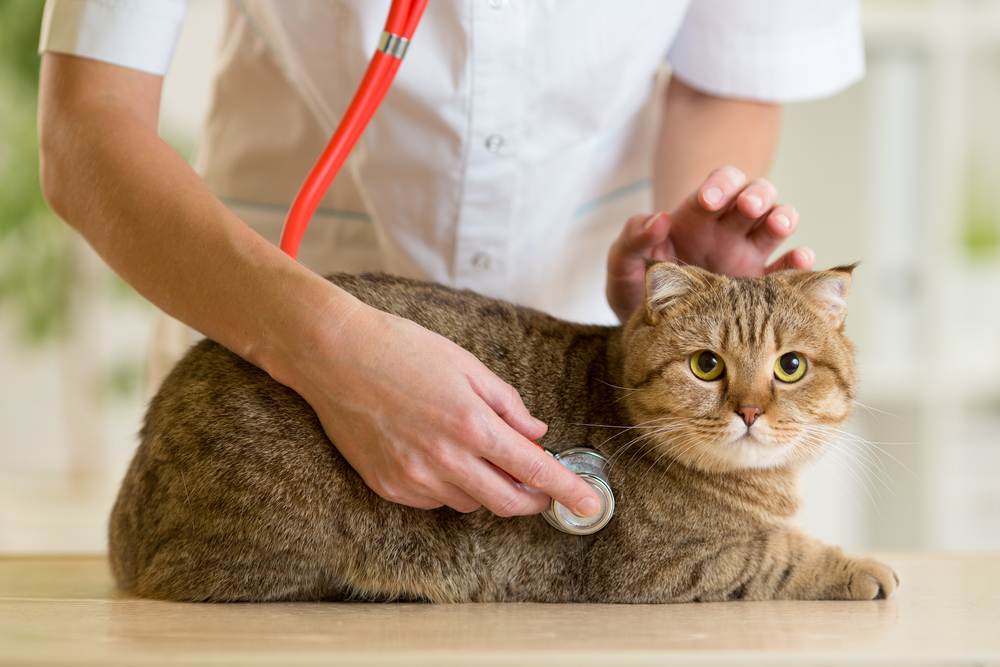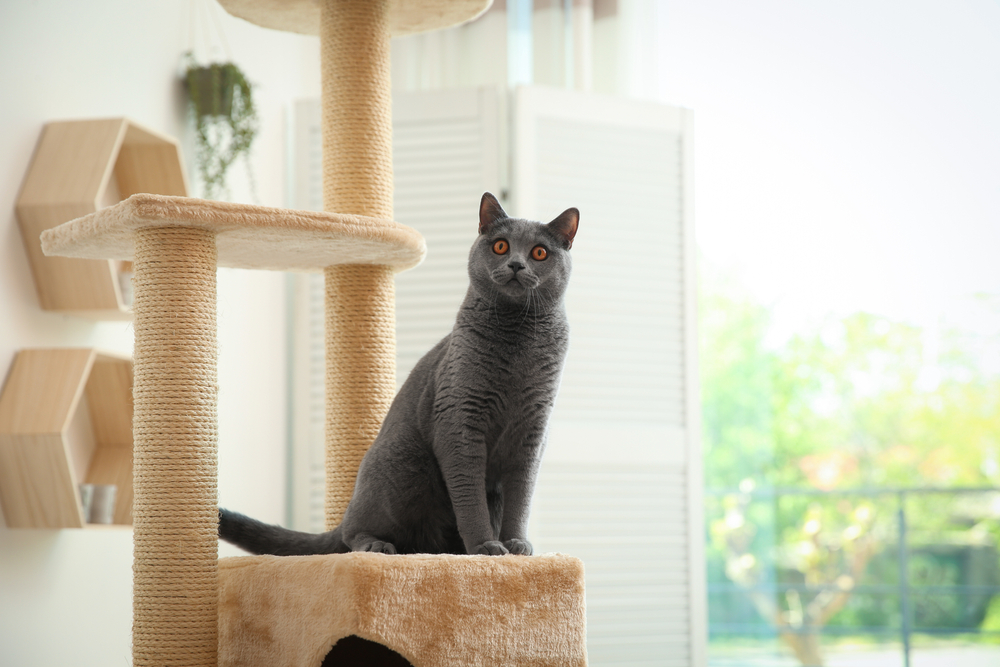From your cat’s perspective, dogs have all the fun—regular walks, outdoor playtime, day care, fun toys, treats, and chews. Meanwhile, because of their naturally independent nature, cats appear as though they want for nothing but a warm bed, a clean litter box, and whatever food they deign to eat that week. But indoor cats often suffer in silence. Although cats’ modern, indoor lifestyle keeps them safe from outdoor hazards, domesticity can leave them feeling bored, depressed, anxious, and ill. Learn how to satisfy and spoil your indoor-only cat by following our Fairfax Veterinary Clinic team’s five strategies for cat happiness.
#1: Feline shui—Create a cat-friendly environment
To remain physically fit and mentally stimulated, your cat needs to express natural behaviors—climbing, scratching, hiding, stalking, and pouncing. Unfortunately, if your cat does not have an appropriate outlet for these activities around your home, they may choose the wrong place and time to express their instinctive behaviors—curtains, furniture, or your ankles during a midnight bathroom trip.
Help your cat satisfy their instinctive needs without sacrificing your furniture, curtains, and other home goods. Try these simple cat-friendly environmental enhancements:
- Perch, please — Ensure your cat has access to an elevated perch, ideally near a window. If your cat is a senior, arrange furniture so they can gradually climb up to the perch without leaping.
- Scratch and win — Scratching is a healthy activity that allows cats to stretch, communicate with other cats, and maintain nail health. Provide several scratching posts or mats that are tall enough to allow your cat a full-body stretch.
- Stealth mode — Predatory behavior includes watching and waiting for prey. Allow your cat to move about your house unnoticed by arranging furniture, nontoxic house plants, or other barriers around the room’s perimeter. Place covered cat beds in cozy corners, so your feline friend has places where they can feel extra secure.
#2: Attention, please! Get social with your cat
Cats may not be as companionable as dogs, but social interaction is necessary for their mental wellbeing. Each cat’s interaction comfort level varies—ranging from cuddle bug to politely aloof—so follow your cat’s lead to determine when they are willing to tolerate your attention. Whether your cat wants you to be up close and personal, or merely in the same room, make a conscious effort to spend time with your cat every day.
#3: On the prowl—Encourage exercise with food enrichment
As natural predators, cats instinctively work (i.e., hunt) for their food. Cats rest 15 to 20 hours per day, and in the wild, they actively explore and hunt for their next meal. However, the modern house cat relies on meals delivered routinely to the same location every day. Rather than creating contentment and security, this cushy lifestyle contributes to boredom, inactivity, obesity, and picky eating habits.
Introduce your indoor cat to food enrichment, and encourage them to get moving—and work for their dinner. Start by offering your cat easy challenges and games to ensure their success, and prevent frustration. Offer your cat appealing treats when first playing food games with them, then gradually transition to their familiar dry food. Food enrichment games include:
- Everyday I’m snufflin’ — Snuffle mats and activity mats encourage sniffing.
- Seek and ye shall find — Scatter your cat’s food or treats around a small room, and let them hunt down each tasty morsel.
- Mind over matter — Puzzle toys encourage cats to reach and manipulate levers, pipes, and drawers to release food that they can see but not touch.
#4: Zen den—Reduce your cat’s stress
Cats are extremely sensitive to stress, which can come from their environment, owner, or other pets. Stress causes cats more than grey hair and wrinkles—instead they can develop serious health and behavioral problems, including urinary conditions, marking, and self-mutilation. To protect your cat from anxiety and illness, try these stress busters:
- Be generous — When one cat in the household prevents pet housemates from accessing resources, the bullied pet becomes anxious. To maintain calm and prevent resource guarding, provide each cat in your home sufficient resources—food and water stations, litter boxes, beds, hiding places, perches, and toys. If you have a senior cat who has difficulty with stairs or stepping over the sides of a tall litter box, ensure they can easily access necessities, such as food, water, and shallow litter boxes, by placing these on each of your home’s levels.
- Be predictable— Because cats find comfort in predictability, maintain a normal routine as much as possible. This includes your cat’s feeding schedule, social interaction, diet, litter type, and your family’s emotional energy.
- Be calm — Artificial feline pheromone products, such as Feliway, promote calm and security. Pheromones are a natural chemical communication form among cats, and they often spread these chemicals around their environment via facial rubbing, scratching, and urine marking. Feliway has been effective in the resolution of many stress-related feline behavior issues.
#5: Health inside and meow-t—Stay current on feline wellness care

Ensure your cat always has their annual wellness care visit. Despite behaving normally and having a healthy appearance, many cats hide pain and illness, which can significantly diminish their quality of life. During your cat’s appointment, our Fairfax Veterinary Clinic veterinarians look for subtle signs that indicate life-altering chronic disease such as:
- Arthritis — Experts now believe that arthritis is more common in cats than in dogs. Arthritis pain may cause your cat to demonstrate changes to their personality, behavior, or mobility.
- Periodontal disease — Dental disease can exist above and below your cat’s gumline, causing chronic inflammation, infection, and pain.
- Renal insufficiency — Toxin buildup causes cats with chronic kidney disease to experience dehydration, nausea, lethargy, and depression.
- Urinary conditions — Stress in your cat’s environment can cause them to develop painful, often chronic urinary disorders, such as feline interstitial cystitis (FIC) and feline lower urinary tract disease (FLUTD).
Your cat’s happiness is more than a state of being—a positive and engaging lifestyle is crucial for their overall health. For additional tips on keeping your cat content, or to schedule their feline wellness exam, contact Fairfax Veterinary Clinic.








Leave A Comment